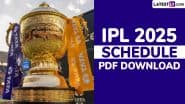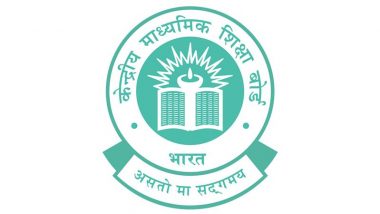New Delhi, December 30: CBSE has released Class 10th Date Sheet | Time Table For 2023 Board Exams on www.cbse.gov.in. The CBSE Class 10 Date Sheet | Time Table 2023 contains the list of subjects with the exam dates. As per the officials, the CBSE Class 10th Exam 2023 will commence from 15th February 2023. The Class 10 or Secondary exam date sheet will begin on February 15 and will end on March 21, 2023. The examination for Class 10, 12 will begin at 10.30 am and will end at 1.30 pm. The CBSE Datesheets | Time Table for Class 10 & 12 2023 have been prepared by avoiding nearly 40,000 subjects combinations to ensure that no two subjects examination of a student's fall on the same date.
CBSE will give 15 minutes reading time to the students of Class 10, 12 to read the question papers. For more related details candidates can check the official site of CBSE. The students must start with their preparations for the highest scores in the upcoming Board Exams as per the prescribed exam schedule and make sure to download the CBSE Class 10th Date Sheet | Time Table for 2023 Board Exams. SSC Exams 2023 Schedule: CGL, CHSL, Constable GD & Steno Exam Dates Released At ssc.nic.in, Check Details.
Before the CBSE Class 10th Date Sheet | Time Table for 2023 Board Exams, Let's dive straight into these 7 Perfect Proven Tips to maximise your score. Also, the experts have curated these Invaluable Subject-wise Tips for Class 10 Students which are mentioned later in this article. CBSE Date Sheet 2023: Board Releases Class 10, 12 Date Sheet, Exams To Begin on February 15; Check Schedule.
1. Make a Study Schedule
Without proper planning, it's almost impossible to get success. To effectively prepare for CBSE Board Exams, students NEED a proper study timetable and then follow the same. While following the study schedule, students must assign more time to difficult subjects for enhanced results.
2. Solve Previous Papers and Sample Papers
Experts suggest taking help of previous years' CBSE Class 10th Question Papers to analyse their preparation level and practicing enough with Class 10 Sample Question Papers. Students must check with time to keep track of their Problem-Solving Speed while solving the Question Paper within the stipulated time limit.
3. Take Breaks while Studying
Sitting at one place and trying to remain focused makes learning difficult for the students. Keep on changing places and even subjects to break monotony. Students are suggested to take short breaks while studying. Doing 10-15 minutes of exercise will also help to stay fit, active, and mentally prepared for CBSE Class 10 2023 Board Exams.
4. Group Study Helps
Studying with friends is always fun and helps to learn even faster. Listening and speaking always help in better learning. Group study helps in understanding the concepts much faster. Moreover, boring topics can be interesting in group study sessions to extend the study schedule longer for students.
5. Avoid Using Slangs
Always remember that spoken and written English are not the same. Using slang words or SMS language might appear as a spelling mistake to the teacher and one might get penalized for it.
6. Rest is Good
Stress, fear, and anxiety hampers the preparation and doesn't let you properly hone your learnings while preparing for Board Exams. So, it is suggested to get a proper night sleep and start relaxing your mind while preparing, especially before the exam day.
7. Write Appropriate Answers
After all the preparation for the Class 10 Board Exam, Students must follow the proper technique and strategy to write their answers in the best possible way and complete the exam on time.
Use Promo Code "PREPUP" To Redeem 50 per cent OFF --Valid For 30th December Only. Redeem now at OswaalBooks.com
Recommended link for CBSE Sample Papers | Question Banks | Last Minute Preparation System Class 10 For 2023 Board Exams: https://bit.ly/3GtxmTB
Subject-wise Tips to Ace CBSE Class 10 Board Exam 2023
a) Science
In Biology, 'Heredity and Evolution' carries huge weightage, followed by 'Our Environment' and 'How Do Organisms Reproduce'. Also, the Reproductive System in Human Beings, Food chain and Food Web, Monohybrid and Dihybrid Cross are more likely to come this year.
In Chemistry, 'Carbon and its Compounds hold more weightage than 'Periodic Classification of Elements'. Modern Periodic Table, Bonding of carbon are also quite important and should not be ignored while preparing.
In Physics, the weightage is given to 'Electricity', followed by 'Magnetic Effects of Electric Currents'. Important topics include, Electrical circuit, Common measuring instruments, Joule's heating effect of current, Magnetic field and field lines, Force on a moving charge in a magnetic field, Electric motor, Electromagnetic induction.
Overall, maximum weightage is given to Biology, then Chemistry followed by Physics.
The Types of Questions that students are going to face in CBSE Class 10 Boards Exams include 'Case Study-based Questions' and 'Short Answer Type Questions'. But experts suggest that emphasis will be given on Application-based Questions.
b) Mathematics
Thoroughly practicing Subjective Type Questions is important to learn the stepwise method of answering questions.
Important Chapters - Quadratic Equations, Arithmetic Progressions, Circles, Surface Areas, and Volumes.
Case Study Questions from important topics - 'Surface Areas and Volumes' and 'Some Applications of Trigonometry'
Tools of Revision - Use Mind Maps as a quick recollection tool.
Repeatedly practice with NCERT and Exemplar problems with Sample Papers.
Solve Sample Papers for both basic and standard Mathematics within stipulated time.
c) Social Science
Since Social Science is both fact and concept based, in-depth understanding is required to clarify, and ingrain your concepts by repeated readings of NCERT. Relating concepts in an interconnected manner helps to identify the weak areas.
Analysis of Examination Pattern - The detailed 'blueprint of the Examination Pattern' also called sample papers is also important. The subject-wise distribution of marks issued by CBSE must also be thoroughly analysed.
Distribute time for each subject in advance as some chapters require more time for revision. All four subjects - History, Geography, Economics and Political science carry equal weightage.
d) English
Reading Comprehension: Read the questions CAREFULLY before jumping to the passage. If the passage is with difficult vocabulary or is quite long, still you should skim through the information and seek relevant data to find the correct answer.
Writing: Practice writing letters with correct formats, formal tone, and expression. Avoid using fancy, verbose writing style. Comprehensive, clear, and logical style of argumentation must be practiced. For analytical paragraphs, use comparative phrases while preparing the report of the bar graphs, pie-charts, etc. Write the conclusion of the report in clear words, rather than using fancy quotes or idiomatic expressions.
Grammar: Practice Editing, Omission, Gap-filling Questions based on tenses, subject-verb agreement, prepositions, and other parts of speech. Sentence Transformation questions must be carefully practiced in dialogue conversion and process writing format.
e) Languages
Understand the Syllabus & Paper Pattern thoroughly focusing on the tone, mood, theme, and character traits of the speaker. Read the chapters thoroughly to devise an effective preparation strategy for the exam.
Critical appreciation of the poems and lessons is important, also the core idea behind the chapters must be remembered. Solve Previous Year Question Papers and Mock Test Papers will help to develop Time-Management Skills and accuracy of writing.
This story has been provided by SRV. ANI will not be responsible in any way for the content in this article.
(This is an unedited and auto-generated story from Syndicated News feed, LatestLY Staff may not have modified or edited the content body)













 Quickly
Quickly



















